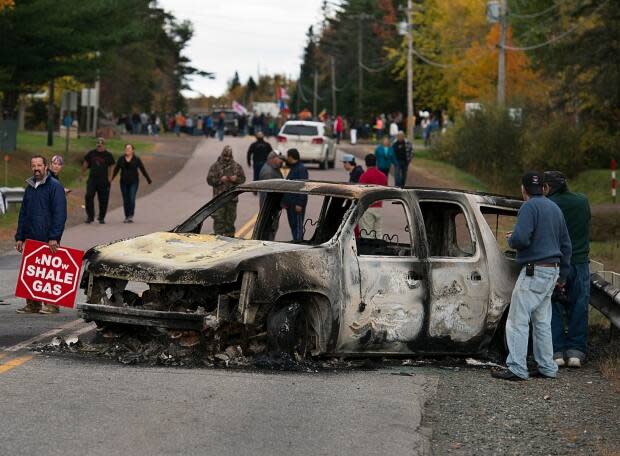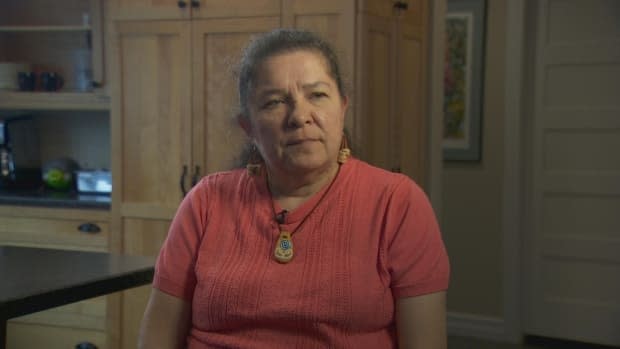Rexton shale gas protesters disappointed by aspects of report on 2013 RCMP conduct
Susan Levi-Peters says the events of October 2013 shouldn't have happened.
That's when about 200 RCMP officers were deployed to remove protesters opposing shale gas exploration by SWN Resources Canada near Rexton.
Many of the protesters who opposed the exploration work were Indigenous people from nearby Elsipogtog First Nation, including Levi-Peters. Protesters blocked access to a company compound and set up an encampment that police cleared out Oct. 17.
Dozens were arrested, five police vehicles were burned and more than 21 complaints about the police conduct were filed with the Civilian Review and Complaints Commission.
"I think it could have been done more professionally," Levi-Peters said of the police response.
Many of the complaints touched on the use of force by officers during the months leading up to the Oct. 17 clash and during that day in what the report describes as a riot.
The commission's 200-page report released Thursday says officers moved in against a backdrop of "rising tension, threats, a blockade, widespread rumours of guns and explosives."

The report concludes the force used by officers can be considered justified.
"The Commission concludes that, given the risks posed by the protesters' conduct, and reasonable concerns for the safety of RCMP members and the public, the use of force was generally necessary in the circumstances and was proportional to the conduct encountered by the members," the report states.
Levi-Peters doesn't accept that.
"I cannot see it being justifiable. I can't agree with a lot of how they handled it, no, based on what I saw in court, the videos, what I experienced personally on the ground," she said.

The report does, however, question the tightness of zip ties used as handcuffs on some protesters.
Other findings include:
Some RCMP surveillance practices and physical searches were inconsistent with protesters' Charter rights
Video showed RCMP officers at the protest sites generally appeared to be aware of the need to respect Indigenous sacred ceremonies and items, though officers didn't have sufficient training in Indigenous cultural matters.
Officers didn't differentiate between Indigenous and non-Indigenous protesters when making arrests, nor demonstrate bias against Indigenous protesters generally.
Jim Emberger has waited years for the report. The spokesperson for the New Brunswick Anti-Shale Gas Alliance was discouraged that in many instances examined by the commission it sided with police.
"There was much in the report that tended to come down to a 'he said, she said' … that if there wasn't any video evidence of something, things were resolved in favour of the RCMP," Emberger said Thursday.
He says one surprising aspect of the report looked at the actions of RCMP crisis negotiators just before the Oct. 17 clashes.
Negotiators were speaking to protesters that had blocked several of the security workers at the shale gas company's compound from leaving.
The negotiators had succeeded in allowing those workers to be let go and swapped with RCMP officers, the report says. RCMP offered tobacco to the protesters, an act the report describes as a a profound peace-making statement.
But the negotiating team wasn't aware that other officers were preparing to move in on the protester's camp.
"Whether the gifting of tobacco was perceived as a peace offering, a show of respect, or a symbol of honourable intent, when the Indigenous protesters at the campsite woke the next morning to find tactical troops about to "invade" their camp, it was seen by them as a serious act of betrayal," the report states.
Closing a chapter
Levi-Peters hopes the RCMP act on the report's recommendations for changes, and was happy to see that the need for cultural sensitivity training was included in the findings.
The RCMP, in a response included in the report, accept some of the critical findings but rejected others, including one relating to how it collected information on social media.
Levi-Peters said what unfolded has resulted in distrust of police.
"I'm also happy that it's finally done," she said of the report. "Maybe we can close that chapter and start fresh."


